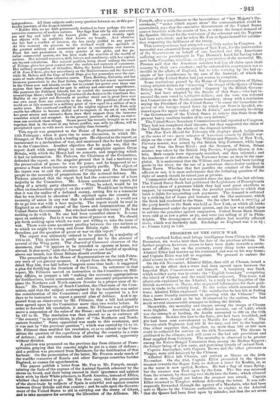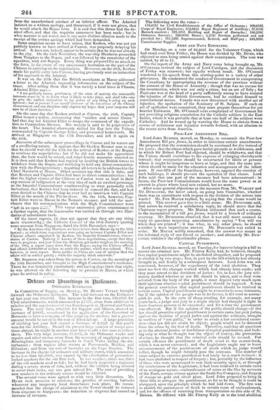PROGRESS OF THE OPIUM WAR.
The overland Indian mail brings intelligence from China to the 18th December, six weeks later than the date of the previous advices. No further progress, however, seems to have been made towards a settle., ment of affairs ; but on the contrary, every thing looks untoward, Admiral Elliot had thrown up his command, and was on his way home; and Captain Elliot was left to negotiate. We proceed to narrate the chief events in the order of time.
On the 6th November, Admiral Elliot, then still at Chusan, issued a notice, to the effect that a truce had been agreed upon between the Imperial High Commissioner and himself. A boundary was fixed, which neither party was to cross ; the "English boundary" comprising the island of Chusan and the small islands adjacent. This truce was afterwards explained by the Admiral, in a reply to the inquiries of the British merchants at Macao, who requested information for their guid- ance in trade, to be strictly local. In the notice which announced the truce, Admiral Elliot expressed " the satisfaction he has felt at finding that a more friendly intercourse is opening with the Chinese." The truce, however, is said to be but ill observed by the natives, who had made several unsuccessful attempts to kidnap the British.
Meanwhile, the mortality and disease among the troops at Chum were frightful. According to an official account, out of 3,420, which was the strength at landing, the deaths amounted to 309 on the 11th November. Besides this loss to the force, 200 had been invalided, and 400 had been sent convalescent to Manilla for change of air. The Twenty-sixth Regiment had 100 fit for duty, and 500 in the hospital. One writer supposes that, altogether, no more than 500 or 600 men could be collected for service on the 24th November. The disease is attributed to the climate, and still more to the bad salt provisions and flour supplied from Calcutta. The mortality is observed to be greater among the Native Bengal Volunteers than among the Madras Sappers ; the former being of a low caste, and partaking largely of animal food. Captain Anstruther, with Captain Brown and the other prisoners at Ningpo, were still detained by the Chinese. Admiral Elliot left Chusan, and arrived at Macao on the 20th November. On the 21st, Captain Elliot proceeded in the Queen steamer towards the Bogue forts, to deliver a letter for Keshin, or, as as the name is now spelled, Keshen. He had a flag of truce flying; but the steamer was fired upon by the forts. The fire was returned from the steamer, by throwing two shells into the forts ; which silenced them at once, though not before the steamer was struck. Captain Elliot returned to Tongkoo without delivering the letter. It was sub- sequently forwarded through the agency of a Mandarin, who had been sent to Macao by the Chinese authorities, to explain to the Admiral that the Queen had been fired upon by mistake, and that the act arose
from the unauthorized conduct of an inferior officer. The Admiral insisted on a written apology, and threatened, if it were not given, that he would attack the Bogue forts. It is said that this threat had the de- sired effect, and that the requisite atonement has been made ; but in what manner is not stated, nor is any more distinct allusion made to the receipt of the written apology which had been demanded.
Some suspicion seems to have arisen, that Keshen, who was not yet publicly known to have arrived at Canton, was purposely delaying his arrival. It does not, indeed, appear to be certain that he was not already in the city. On the 24th November, the war-ship Blenheim proceeded from Tongkoo to the Bogue, and was followed by the remainder of the squadron, with 400 Sepoys. Every thing was prepared for an attack on the forts, in the event of any unnecessary hesitation on the part of the Chinese in carrying on the negotiations. However, on the 29th, Keshen made his public entry into Canton, having previously sent an intimation -of his approach to the Admiral.
It was on the 25th that the British merchants at Macao addressed a letter to the Admiral, requesting information on the subject of the truce. After telling them that it was merely a local truce at Chasm, Admiral Elliot says-
. " 1 am perfectly aware, gentlemen, of the state of anxiety the mercantile interests must be in to know what is likely to take place, and shall take care to give the earliest intimation in my power of any thing bearing on such interest ; but at present I am myself ignorant of the intentions of the Chinese Government, and can therefore only express my hopes that your suspense will ROW be of short duration."
On the same day that Keshen arrived at Canton, the 29th, Captain Elliot issued a notice, announcing that "sudden and severe illness " had that day led Admiral Elliot to resign the command of the expedi- tion to Commodore Bremer. His malady is said to be palpitation of the heart. The Admiral afterwards shifted his flag into the Volage, commanded by Captain George Elliot, and proceeded homewards. He arrived at Singapore on the 17th December, and left it again on the 20th.
Accounts of the subsequent proceedings in Canton and its waters are of a conflicting nature. It appears that Sir Gordon Bremer sent to say that he should wait till the 17th for the arrival of Keshen at the Bogue, to continue the negotiations : but if he did not make his appearance then, the forts would be seized, and other hostile measures resorted to. It is then said that Keshen had replied by desiring the British forces to withdraw from the Bogue, and declining to hold any direct communica- tion with the Plenipotentiary ; requiring all letters to be addressed to the Chief Mandarin at Macao. Other accounts say that this is false, and that Keshen and Captain Elliot had been in direct communication ; but that the higher classes of the Chinese at Canton were so loud in their expressions of indignation at the very idea of such an exalted personage as the Imperial Commissioner condescending to treat personally with barbarians, that Keshen had been induced to conceal the fact, and had even denied to the Chinese that be ever had an interview with Captain Elliot at the mouth of the Pei-ho river. On the 13th, however, Cap- tain Elliot went to Macao in the Nemesis steamer, and told the suer- -"bents that his communications with the High Commissioner were "left in an open giIttC." niF vague expression gives countenance to a farther report, that the intercourse was carried on through two Man- darins of subordinate rank.
Of the latest reports, (it does not appear that they are any thing more trustworthy,) the Calcutta Courier of the 18th January quoting some account from Singapore, dated the 30th December, says-
" By the American ship Morrison, we have letters from Macao ue to the 16th instant ; at which time, negotiations were going on between Captain Elliot and Chinese officers empowered by Keshen, the Imperial Commissioner, who re- mains at Canton. Nothing is known of these negotiations, except that they were in progress; and just before the Morrison got under weigh on the morning of the 18th, a report came down from the Bogue, saying the Chinese officers had offered 5,000,000 of dollars to settle the matter, which was refused. This, however, is mere report. Some parties in China are now of opinion that the affairs will be settled quietly ; while the majority think otherwise."
Mr. Staunton was taken from his prison at Canton, on the morning of the 10th December, and brought to the High Commissioner's residence. There he was hospitably entertained ; and having slept there that night, he was allowed on the following day to proceed to Macao, at which place he arrived in safety.



























 Previous page
Previous page